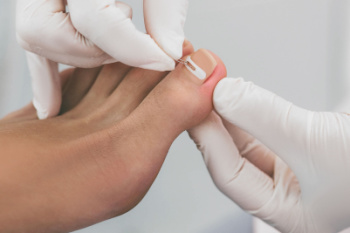
Dr. Kenneth Rosenthal
Dr. Jonathan C. O’Quinn
Dr. Michael J. Price

Dr. Kenneth Rosenthal
Dr. Jonathan C. O’Quinn
Dr. Michael J. Price

The Achilles tendon plays an essential role in your daily movements, facilitating activities like running, jumping, and even just walking. This tendon connects the heel bones to the calf muscles, allowing you to lift your heels and push up on your toes with ease. However, when faced with a ruptured or torn Achilles tendon, surgical intervention may be necessary to restore functionality and reduce the risk of re-rupture. An Achilles tendon rupture can occur during activities that involve sudden, forceful movements, or it may happen from chronic wear and tear. After such an injury, surgical options are required to reattach the torn ends of the tendon. The two primary options are open surgery and percutaneous surgery. Open surgery involves a single large incision at the back of the leg, while percutaneous surgery utilizes several smaller incisions. Surgeons may opt to wait a week post- injury to allow swelling to decrease before proceeding with either approach. In both cases, the surgeon sews the tendon back together through the incisions. Rehabilitation from Achilles tendon surgery is likely to take between six and nine months. For more information about managing an Achilles tendon rupture, it is suggested that you make an appointment with a podiatrist.
Achilles tendon injuries need immediate attention to avoid future complications. If you have any concerns, contact one of our podiatrists of Eastern Carolina Foot & Ankle Specialists. Our doctors can provide the care you need to keep you pain-free and on your feet.
What Is the Achilles Tendon?
The Achilles tendon is a tendon that connects the lower leg muscles and calf to the heel of the foot. It is the strongest tendon in the human body and is essential for making movement possible. Because this tendon is such an integral part of the body, any injuries to it can create immense difficulties and should immediately be presented to a doctor.
What Are the Symptoms of an Achilles Tendon Injury?
There are various types of injuries that can affect the Achilles tendon. The two most common injuries are Achilles tendinitis and ruptures of the tendon.
Achilles Tendinitis Symptoms
Rupture Symptoms
Treatment and Prevention
Achilles tendon injuries are diagnosed by a thorough physical evaluation, which can include an MRI. Treatment involves rest, physical therapy, and in some cases, surgery. However, various preventative measures can be taken to avoid these injuries, such as:
If you have any questions please feel free to contact our office located in Greenville, NC . We offer the newest diagnostic tools and technology to treat your foot and ankle needs.

Pregnancy is a joyous but challenging period, with an increased risk of falls affecting approximately one-third of expectant mothers. To reduce this risk, pregnant women may want to avoid slippery surfaces, use stair rails, opt for flatter shoes, and move at a measured pace. Engaging in regular physical activities, such as yoga or walking, has consistently shown to reduce the likelihood of falls. Research underscores the significance of maintaining ankle stiffness to prevent falls during pregnancy. A recent study revealed that women in their third trimester face challenges with postural equilibrium, detected through stability tests. Wearing a maternity support belt emerges as a practical solution, as it helps to enhance balance and reduce fall risk, especially in the later stages of pregnancy. In addition to these measures, maintaining a well-balanced diet and staying adequately hydrated contributes to overall health during pregnancy. Adequate fluid intake helps prevent dizziness and promotes joint flexibility, which further reduces the risk of accidental falls. By incorporating these lifestyle adjustments, expectant mothers can navigate the physical changes of pregnancy more safely and enjoy a healthier and stable journey into motherhood. For help in dealing with falls during pregnancy, it is suggested that you schedule an appointment with a podiatrist.
Pregnant women with swollen feet can be treated with a variety of different methods that are readily available. For more information about other cures for swollen feet during pregnancy, consult with one of our podiatrists from Eastern Carolina Foot & Ankle Specialists. Our doctors will attend to all of your foot and ankle needs.
What Foot Problems Can Arise During Pregnancy?
One problem that can occur is overpronation, which occurs when the arch of the foot flattens and tends to roll inward. This can cause pain and discomfort in your heels while you’re walking or even just standing up, trying to support your baby.
Another problem is edema, or swelling in the extremities. This often affects the feet during pregnancy but tends to occur in the later stages.
How Can I Keep My Feet Healthy During Pregnancy?
If you have any questions please feel free to contact our office located in Greenville, NC . We offer the newest diagnostic and treatment technologies for all your foot and ankle needs.

Selecting the right pair of running shoes is paramount for a comfortable and injury-free experience. When embarking on this journey, consider the shoe's fit as a top priority. The shoe should snugly cradle the foot without causing tightness, allowing for a secure yet comfortable feel. Pay attention to the arch support, ensuring it complements the natural arch of your foot. Cushioning is vital for impact absorption, protecting joints and reducing the risk of injuries. Consider the type of running you engage in, including road running, trail running, or a mix of varied surfaces, and choose shoes tailored to the specific terrain. The heel counter, the back portion supporting the heel, should provide stability. Flexibility is also key. The shoes should bend where your foot naturally does. Lastly, examine the outsole for durability and traction. If you are seeking additional information about what type of running shoes to purchase, it is suggested that you confer with a podiatrist, who can provide you with the knowledge you are seeking.
If you are a runner, wearing the right running shoe is essential. For more information, contact one of our podiatrists from Eastern Carolina Foot & Ankle Specialists. Our doctors can provide the care you need to keep you pain-free and on your feet.
Choosing the Right Running Shoe for Your Foot Type
To increase performance and avoid the risk of injury, it is important to choose the right running shoe based on your foot type. The general design of running shoes revolves around pronation, which is how the ankle rolls from outside to inside when the foot strikes the ground.
If you have any questions please feel free to contact our office located in Greenville, NC . We offer the newest diagnostic and treatment technologies for all your foot and ankle needs.

Chronic ingrown toenails can be a persistent and painful foot condition. They occur when the edge of the toenail, usually on the big toe, grows into the surrounding skin, leading to discomfort, swelling, redness, and sometimes infection. While an occasional ingrown toenail is common and often manageable at home, chronic ingrown toenails are a recurring problem. Several factors can contribute to chronic ingrown toenails, including improper nail trimming, wearing tight or ill-fitting shoes, genetics, and underlying foot deformities. Over time, chronic ingrown toenails can lead to pain and discomfort, making it difficult to walk and wear shoes comfortably. Treatment options for chronic ingrown toenails may include gently lifting the ingrown edge of the nail and placing cotton or dental floss under the nail to encourage it to grow away from the skin. In more severe cases, a podiatrist may need to trim or remove the ingrown portion of the nail, and in some instances, surgery may be necessary to permanently correct the problem. If you have ingrown toenails and you are experiencing pain or if it is a repeated issue, it is suggested that you schedule an appointment with a podiatrist for treatment and proper management of this condition.
Ingrown toenails may initially present themselves as a minor discomfort, but they may progress into an infection in the skin without proper treatment. For more information about ingrown toenails, contact one of our podiatrists of Eastern Carolina Foot & Ankle Specialists. Our doctors can provide the care you need to keep you pain-free and on your feet.
Ingrown Toenails
Ingrown toenails are caused when the corner or side of a toenail grows into the soft flesh surrounding it. They often result in redness, swelling, pain, and in some cases, infection. This condition typically affects the big toe and may recur if it is not treated properly.
Causes
You are more likely to develop an ingrown toenail if you are obese, have diabetes, arthritis, or have any fungal infection in your nails. Additionally, people who have foot or toe deformities are at a higher risk of developing an ingrown toenail.
Symptoms
Some symptoms of ingrown toenails are redness, swelling, and pain. In rare cases, there may be a yellowish drainage coming from the nail.
Treatment
Ignoring an ingrown toenail can have serious complications. Infections of the nail border can progress to a deeper soft-tissue infection, which can then turn into a bone infection. You should always speak with your podiatrist if you suspect you have an ingrown toenail, especially if you have diabetes or poor circulation.
If you have any questions, please feel free to contact our office located in Greenville, NC . We offer the newest diagnostic and treatment technologies for all your foot care needs.